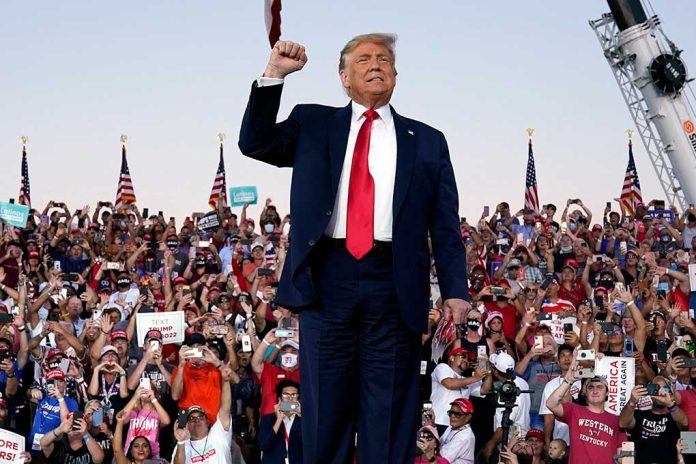
Donald Trump’s newly unveiled Free Speech Initiatives aim to tackle censorship concerns, but can they ensure the long-term protection of First Amendment rights?
At a Glance
- Trump introduced policies to dismantle censorship and restore free speech in the U.S.
- He accused certain entities of conspiring to silence Americans.
- Plans include revising Section 230 and proposing a digital Bill of Rights.
- Trump argues this is a pivotal fight for America’s and Western Civilization’s survival.
Trump’s New Free Speech Initiatives Unveiled
President Donald J. Trump recently announced an ambitious policy initiative focused on dismantling censorship and restoring the First Amendment rights in the United States. These measures are aimed at addressing the perceived threats posed by tech giants, educational institutions, and other sectors accused of censoring free expression. By leveraging a mix of executive actions and legislative proposals, Trump seeks to foster an environment where diverse opinions can be expressed freely and without fear of repercussion.
This alone puts DJT in company with the greatest U.S. presidents since Lincoln. The globalist project has laid siege to democracy and freedom across the globe. The USA is the final redoubt. President Trump just launched freedom’s counterattack. https://t.co/2brXEjTByg
— Robert F. Kennedy Jr (@RobertKennedyJr) November 9, 2024
Central to Trump’s plan is an executive order aimed at halting federal agencies from collaborating in any form of censorship and prohibiting federal funds from being used to label domestic speech as misinformation. He further seeks to identify and remove federal bureaucrats involved in such activities and engage the Department of Justice to investigate online censorship practices.
Addressing the Censorship Industry
In order to tackle what he describes as a “censorship industry,” Trump aims to revise Section 230 to ensure greater neutrality and transparency from digital platforms. Should these platforms fail to meet these standards, consequences will follow. Trump plans to cease federal funding for non-profits and academic programs engaged in censorship and to introduce penalties for federal officials bypassing constitutionally protected rights. “The fight for Free Speech is a matter of victory or death for America—and for the survival of Western Civilization itself.” stated President Donald J. Trump.
The plan also includes a significant proposal to enact a seven-year cooling-off period for intelligence agency officials before they can join companies handling U.S. user data. Trump’s proposed digital Bill of Rights emphasizes digital due process and assures citizens’ rights regarding content moderation, aiming to empower users in the face of ever-powerful digital platforms.
The Battle for Free Speech and Its Implications
Trump has framed this effort as crucial, underscoring it as a means to sustain America’s, and indeed Western Civilization’s, survival. His pledge to dismantle the prevailing censorship framework has resonated with many who feel silenced by current trends. These initiatives argue that free speech is foundational for a free country, crucial not only in political discourse but as a bedrock of all freedoms Americans cherish.
While these intentions are likely to spark controversy, they bring to the forefront America’s ongoing debate around speech regulation and individual rights in a changing digital landscape.
Sources:
President Donald J. Trump — Free Speech Policy Initiative













